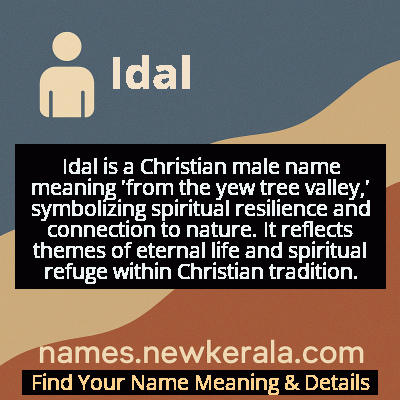Idal Name Meaning & Details
Origin, Popularity, Numerology Analysis & Name Meaning of Idal
Discover the origin, meaning, and cultural significance of the name IDAL. Delve into its historical roots and explore the lasting impact it has had on communities and traditions.
Name
Idal
Gender
Male
Origin
Christian
Lucky Number
8
Meaning of the Name - Idal
Idal is a Christian male name meaning 'from the yew tree valley,' symbolizing spiritual resilience and connection to nature. It reflects themes of eternal life and spiritual refuge within Christian tradition.
Idal - Complete Numerology Analysis
Your Numerology Number
Based on Pythagorean Numerology System
Ruling Planet
Saturn
Positive Nature
Ambitious, efficient, realistic, and authoritative.
Negative Traits
Materialistic, stressed, confrontational, and can be overly ambitious.
Lucky Colours
Dark blue, black.
Lucky Days
Saturday.
Lucky Stones
Blue sapphire, amethyst.
Harmony Numbers
2, 4, 6.
Best Suited Professions
Business leaders, managers, financial services, law enforcement.
What People Like About You
Leadership, determination, organizational skills.
Famous People Named Idal
Idal de Carvalho
Religious Leader
Influential Christian missionary who established churches and educational institutions in rural communities
Idal Ferreira
Educator
Founded Christian-based schools focusing on environmental education and community development
Idal Santos
Musician
Composer of contemporary Christian music blending traditional hymns with modern arrangements
Name Variations & International Equivalents
Click on blue names to explore their detailed meanings. Gray names with will be available soon.
Cultural & Historical Significance
In historical context, names like Idal that reference specific landscapes and flora were common among early Christian communities who saw divine presence in nature. The yew tree's remarkable longevity (some living over 2,000 years) made it a powerful symbol of eternal life and resurrection in Christian art and literature. The combination of tree and valley creates a rich tapestry of meaning that speaks to both spiritual elevation and earthly grounding. This dual nature reflects the Christian understanding of Christ as both divine and human, and the Christian life as journeying through valleys of testing toward spiritual heights.
Extended Personality Analysis
Individuals named Idal are often perceived as grounded, resilient, and deeply connected to their roots, much like the yew trees from which their name derives. They typically exhibit a calm, steady demeanor that provides stability to those around them, combined with a strong sense of integrity and loyalty that makes them reliable friends and family members. Their connection to the 'valley' aspect of their name often manifests as humility and a preference for substance over showmanship. Idals tend to be thoughtful observers rather than impulsive actors, considering situations carefully before making decisions. They often possess a quiet strength that emerges during challenging times, much like the yew tree's legendary longevity and resilience.
In social settings, Idals are often the steady anchors in their communities - not necessarily the most vocal leaders, but the ones people turn to for wise counsel and practical support. Their natural inclination toward patience and perseverance makes them excellent in roles requiring long-term commitment and careful nurturing. Many demonstrate a particular talent for reconciling conflicts and building consensus, drawing on their innate understanding of different perspectives. The spiritual dimension of their name often translates into a deep sense of purpose and moral compass that guides their decisions. While they may not seek the spotlight, their consistent reliability and depth of character earn them lasting respect and trust from those who know them well.
Modern Usage & Popularity
In contemporary times, Idal remains a relatively uncommon but meaningful choice, particularly within Portuguese-speaking Christian communities and among families seeking names with natural and spiritual significance. While not ranking high on popular name charts, it has seen a modest resurgence among parents looking for traditional yet distinctive names with deep roots. The name is most frequently encountered in Brazil, Portugal, and communities with Lusophone heritage. Modern usage often reflects a desire to honor family traditions while embracing names that convey environmental consciousness and spiritual depth. Social media and global connectivity have introduced the name to wider audiences, though it maintains its character as a choice for those valuing heritage and meaning over trends. Its rarity in many regions makes it appealing to parents seeking unique names without being overly unconventional.
Symbolic & Spiritual Meanings
Symbolically, Idal represents resilience, spiritual depth, and connection to heritage. The yew tree component symbolizes eternal life, protection, and transformation - themes that align with Christian teachings of resurrection and spiritual rebirth. Yews were historically planted in churchyards as symbols of the soul's journey from earthly life to eternal life. The valley element signifies refuge, humility, and fertility - a place of spiritual testing and growth where faith is both challenged and strengthened. Together, these symbols create a name that speaks to enduring faith through life's challenges, the importance of spiritual roots, and the quiet strength that comes from deep connection to both faith and nature. The combination suggests someone who provides shelter and wisdom to others while maintaining personal spiritual resilience, embodying the Christian ideal of being in the world but not of it.

